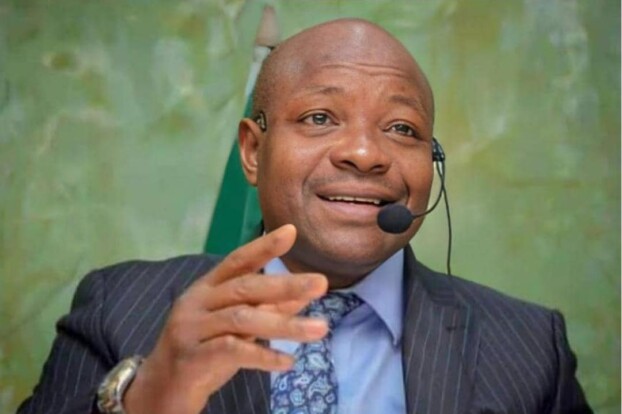Ayoola Ajanaku
The premise of governance is the protection of lives and assets of the citizenry. Internal security remains a cornerstone of national stability, economic growth, and social harmony. However, the increasingly sophisticated and dynamic nature of threats poses a significant challenge to governments and security agencies worldwide. In this context, Adeola Oluwatosin Ajayi has emerged as a visionary leader of Nigeria’s internal security agency, the Department of State Services (DSS) whose innovative strategies and decisive actions have begun to unravel the complex challenges of internal security, akin to solving the proverbial Gordian knot.
The internal security landscape is fraught with numerous challenges, ranging from terrorism and cybercrime to communal clashes and organized crime. These issues are often compounded by socio-economic disparities, political instability, and inadequate infrastructure. For years, the inability to address these interconnected problems holistically has created persistent vulnerabilities within the system. Deola Ajayi, via his well grounded operations background has approached this daunting task with a combination of strategic insight, technological innovation, and grassroots engagement.
One of Ajayi led DSS most remarkable contributions has been the development of a comprehensive security framework that prioritizes prevention, response, and resilience. Understanding that no single approach can address the complexity of internal security threats, he has emphasized the need for collaboration among various stakeholders, including government agencies, private sector actors, and civil society organizations. Key components of his vision include; Ajayi’s spearheading the establishment of real-time intelligence-sharing platforms that enable seamless coordination between security agencies, thereby reducing response times and enhancing operational efficiency.
Ajayi’s reticent approach to internal security has extended to tackling specific and persistent threats such as banditry, farmers-herders clashes, cattle rustling, oil bunkering, economic sabotage, and the protection of critical infrastructure.
Ajayi’s administration has implemented targeted military and paramilitary operations to dislodge bandit strongholds in rural areas. The deployment of surveillance drones and the establishment of rapid-response units have significantly curtailed the activities of bandits and cattle rustlers, restoring stability to affected communities.
Furthermore, recognizing the socio-economic dimensions of these conflicts, Ajayi has introduced mediation platforms that bring together farming and herding communities to foster dialogue and understanding. He has also promoted sustainable grazing practices and developed ranching programs as long-term solutions to land-use disputes.
In addition, Ajayi has prioritized the protection of the nation’s oil infrastructure by strengthening maritime security and monitoring pipelines with advanced technologies. Joint operations with local vigilante groups and the Navy have disrupted major oil theft networks, safeguarding the nation’s economic lifeline and limiting economic sabotage.
A robust framework has been established to secure and protect critical infrastructure and vital assets such as power stations, bridges, and telecommunication networks. Ajayi’s administration has introduced training programs for security personnel to counter sabotage attempts and has deployed surveillance systems to monitor these facilities round-the-clock. Most importantly, the core of any organization is human capital. This window has witnessed a significant pay rise for all and sundry in the DSS with attendant output by the personnel therein to deliver on all parameters of service delivery.
In an era where technology drives both opportunities and risks, The Deola Ajayi led DSS has leveraged innovative solutions to modernize internal security mechanisms. From deploying drones for surveillance in remote areas for crime pattern analysis, his administration has embraced a tech-driven approach to outpace adversaries. Furthermore, Ajayi’s focus on digital literacy and cybersecurity awareness among citizens has created a more informed and vigilant populace.
Ajayi has demonstrated an unparalleled ability to bring together diverse stakeholders to address security challenges comprehensively. His initiatives to strengthen public-private partnerships have not only enhanced resource mobilization but also fostered innovation in tackling persistent issues. By engaging traditional leaders, youth groups, and religious organizations, he has cultivated a culture of collective responsibility for security.
Additionally, he has facilitated cross-border collaboration with neighbouring countries to address transnational threats such as human trafficking, arms smuggling, and terrorism. These partnerships have resulted in joint operations and intelligence-sharing frameworks that have significantly curtailed cross-border criminal activities.
Under Ajayi’s leadership, there has been a marked decline in the frequency and intensity of violent incidents in previously volatile regions. Cybercrime reporting and response rates have improved significantly, reflecting the effectiveness of newly implemented systems. Additionally, public confidence in law enforcement agencies has grown, thanks to his emphasis on transparency, accountability, and the use of non-lethal strategies in managing civil unrest.
The economic impact of improved security is also notable, with increased investor confidence leading to the establishment of new businesses in areas previously deemed unsafe. These developments underscore the correlation between internal security and economic prosperity.
While Deola Ajayi’s strides in internal security are commendable, his work also serves as a blueprint for other developing ecosystems grappling with similar challenges. By combining strategic foresight, technological innovation, and inclusive governance, he has demonstrated that even the most intricate problems can be addressed with determination and ingenuity. Moreover, his focus on sustainability ensures that the systems and frameworks he has put in place can adapt to evolving threats, providing long-term benefits for national security.
In a nutshell, Deola Ajayi’s approach to unlocking the Gordian knot of internal security in our dear nation Nigeria is a testament to the power of visionary leadership and inter-agency collaborative action. His achievements underscore the importance of integrating diverse perspectives and leveraging modern tools to create a safer and more secure society. As his initiatives continue to yield results that are kept under the radar thanks to his meticulous coy modus operandi, they offer hope and inspiration for a future where internal security challenges are no longer insurmountable. His legacy will likely serve as a guiding light for future leaders in the quest for sustainable security solutions.








